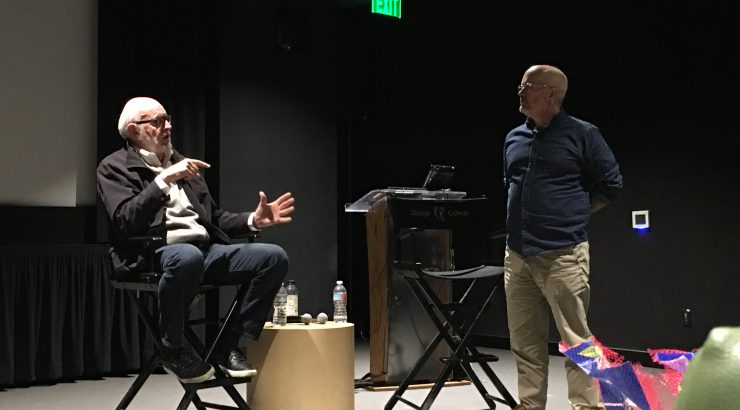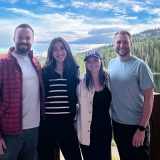Frank Oz Talks About His Career, His Style, and Death at a Funeral
March 21, 2017
Working at Dodge College has afforded me some wonderful opportunities to meet some of the greatest people involved in the world of entertainment. But none of them compared to when legendary filmmaker and puppeteer, Frank Oz, visited a few weeks ago.
Oz visited James Dutcher’s Film Script Analysis class to discuss his film Death at a Funeral. What followed was an incredibly candid look at not only the film itself, but also his career overall. In fact, Oz stayed well after the class’ scheduled end time to continue answering questions from the curious students.
Before taking center stage, however, Oz sat in the back of the Cloobeck Screening Room watching the film, laughing along with the students. When it was over, he joined Dutcher up front to begin his talk.
Oz was very clear that, unlike most directors, he loves having the screenwriter on set alongside him.
“I love their contributions,” said Oz. “During rehearsals, Dean (writer Dean Craig) had lots of new ideas that we worked in, and we changed a lot on the floor.” Oz went on to explain that what is on the page doesn’t always translate to the screen, so having the writer on set helped to work out the kinks.
Oz also praised Dean Craig for doing a wonderful job of giving every character a motivation, something to strive for.
“I don’t consider the film a comedy, either,” he said. “It’s a farce, and it’s my job as the director to make the sad stuff entertaining. You don’t have to be funny all the time.”
When it came time to cast the film, the script had clear cut descriptions for the types of people to look for, but Oz had other ideas.
“Sometimes, the character on the page is not who you cast. For example, one character was described as this good-looking guy, but that wasn’t as funny to me. So what did I do? I cast someone opposite that, and the role played perfectly,” said Oz.
Casting Matthew Macfadyen as his lead was a perfect choice also, he believed.
“Matthew set the tone for this ridiculous world. He was so subtle and underplayed, and everyone had to match him,” said Oz. “I like restraint in comedy…the funny is in the reaction, not the action.”
Oz also does a lot of prep work for his films, which means he finds the scenes that don’t work before hand to help change them. He spoke of working on The Score with Robert DeNiro, Marlon Brando, and Edward Norton, and one scene in particular that just wasn’t working the way he wanted. He spent a weekend with stars DeNiro and Angela Bassett, working on it together, on their own time, to improve it.
“You can’t do that kind of thing the day of shooting. It never works,” said Oz.
One of the students asked how much preparation in general he did, and Oz said that work for Death at a Funeral, he had 6 weeks, whereas Little Shop of Horrors, he had a year.
“I preferred the shorter time frame, honestly,” said Oz. From there, Oz was insanely curious about the student’s prepping process, asking for every step along their way. He was impressed at how massive the productions here at Dodge College are.
He was also very open about his own process in general, touching upon how he shoots comedies.
“I time everything out in my head when reading a script, and try to figure out how long each scene will take. I make a list of ‘non-important’ scenes, and don’t spend as much time on set with them than I would the bigger scenes. This way, the actors aren’t tired from all the takes on a smaller scene, and can give the bigger ones their all,” said Oz.
He was also cautious about good ideas happening on set.
“They are dangerous. Saying no to them is difficult. But when you’re the director, you have to make your own mistakes,” he said. On the other hand, though, he thought that, as a first time director, the biggest mistake he made was thinking he had to do everything.
“I gave too many orders, and missed too many opportunities to collaborate. There was no need to bark orders…I already had the job, I didn’t need to prove myself!” said Oz.
He thrives on set and loves the interaction…but resents the editing process.
“I hate waiting for music, for special effects. It takes forever. But I know it’s needed,” he said.
The best advice to the students though was that they needed to explore on their own, and see what their own style was.
“Do what feels right. Make your own mistakes. Otherwise you’ll never learn.”


